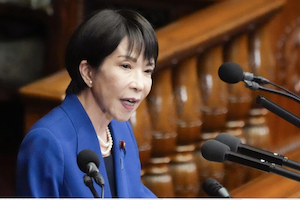Kishida and Trump Hold First Talks, Agree to Cooperate on AI and 6G

Japanese Prime Minister Sanae Takaichi and U.S. President Donald Trump held their first summit meeting on October 28, during which the two countries agreed to cooperate in seven advanced fields, including artificial intelligence (AI) and 6G communications, and to expand exports to emerging nations as a countermeasure against China.
In coordination with Trump’s visit to Japan, the two governments plan to sign a “Japan-U.S. Memorandum of Cooperation on the Technology Prosperity Agreement”, which will state that both nations aim to build “a new golden age of innovation.” The initiative seeks to develop and promote internationally trusted AI infrastructure and communication networks in emerging countries, setting global standards to offset China’s growing influence in advanced technologies.
President Trump attended the ASEAN Summit in Kuala Lumpur on October 26 before traveling to Japan on the 27th to meet Takaichi. The two leaders later boarded Marine One together en route to the U.S. Navy’s Yokosuka base in Kanagawa Prefecture, where they inspected the USS George Washington, a nuclear-powered aircraft carrier. Allowing a foreign leader aboard Marine One is considered highly unusual and is seen as a symbolic gesture of strengthening the U.S.-Japan alliance and personal rapport between the two leaders.
During the meeting, Takaichi sought to enhance Japan’s oversight of its $550 billion investment in the United States, an amount equivalent to more than one-tenth of Japan’s GDP. The agreement grants the U.S. substantial operational control over the investment, raising concerns in Tokyo that funds could be diverted to projects not strategically beneficial to Japan. Japanese officials also fear potential tariff retaliation if they oppose Washington’s allocation decisions.
Amid Trump’s recent cooling of ties with traditional Euro-Asian allies and rising security threats from China, North Korea, and Russia, Japan has grown increasingly uneasy. Takaichi is expected to voice concerns about China’s continued militarization of the South China Sea, while urging Trump to recommit to the long-standing Japan-U.S. security alliance to help deter Beijing’s expanding regional influence.
A known supporter of Taiwan, Takaichi is also expected to use the summit to confirm whether Trump remains committed to Taiwan’s security and to clarify U.S. strategic intentions in the Indo-Pacific. Analysts note that Takaichi aims to build a stable, long-term relationship with Trump, similar to the close ties former Prime Minister Shinzo Abe once maintained with him.
- 109 reads
Human Rights
Fostering a More Humane World: The 28th Eurasian Economic Summi

Conscience, Hope, and Action: Keys to Global Peace and Sustainability

Ringing FOWPAL’s Peace Bell for the World:Nobel Peace Prize Laureates’ Visions and Actions

Protecting the World’s Cultural Diversity for a Sustainable Future

Puppet Show I International Friendship Day 2020

